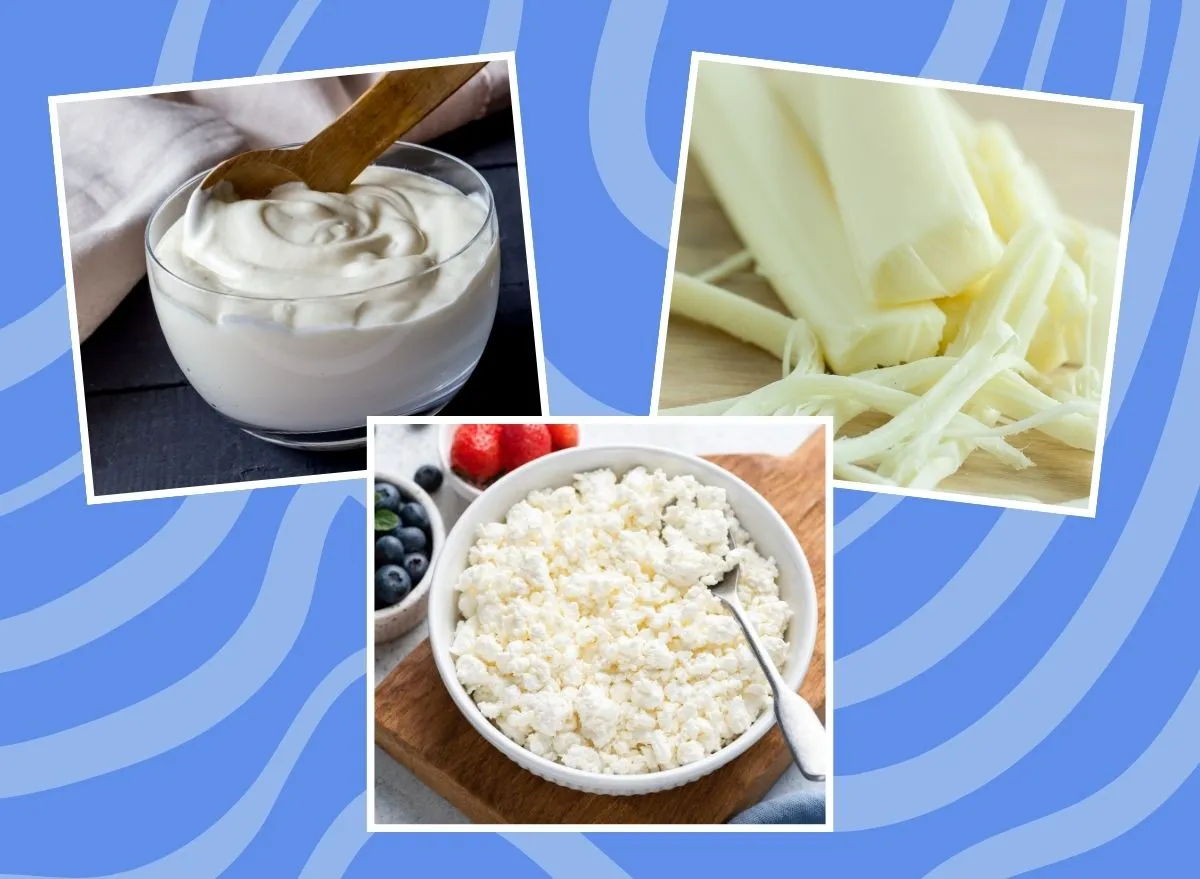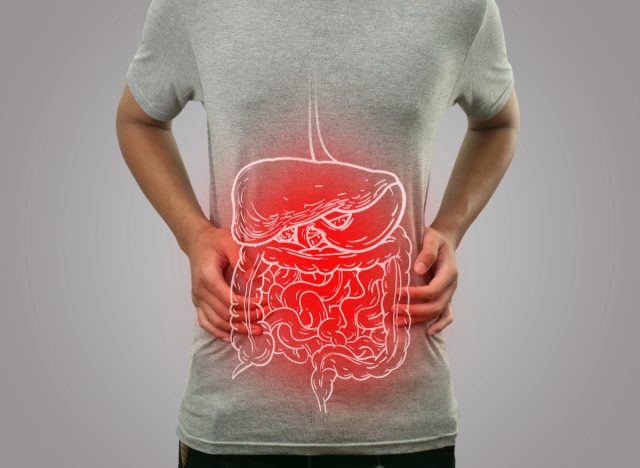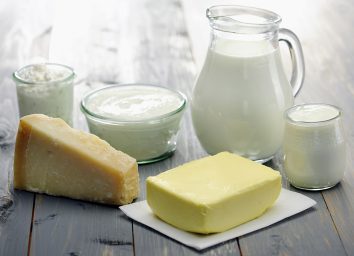Surprising Side Effects of Eating Dairy, Says Science

As strange as it sounds, dairy has become a controversial topic. It used to be universally accepted that milk “does a body good,” as the ’80s commercial slogan hammered into our brains, and that it would make our bones and teeth strong thanks to its calcium content. Not only that, but years later we heard the delicious news that drinking chocolate milk was the perfect workout recovery drink and would help us burn more fat.
So what’s not to like? For starters, dairy detractors would tell you that many of the studies that tout the benefits of drinking dairy are the result of the deep-pocketed dairy industry marketers and lobbyists. Theories aside, when you consider all the data available, researchers have found that these benefits may have been blown out of proportion. A study published in The Journal of Clinical Nutrition that reviewed nearly 30 studies concluded that there wasn’t sufficient evidence to support the “beneficial effect of increasing dairy consumption on body weight and fat loss.” So while some benefits of dairy do exist, drinking and eating more of it won’t do much to support weight loss—contrary to what one-off (likely biased) studies have found.
So we turned to health experts and bonafide studies to get to the bottom of the dairy debate. Read on for the (sometimes surprising!) side effects of eating dairy, and for more on how to eat healthy, don’t miss 7 Healthiest Foods to Eat Right Now.
Adult Acne

As a grown up, you may not drink as much milk as you did as a kid, but chances are you’ve upped your dairy intake with more sophisticated sources, such as cheese and yogurt—and that can wreak havoc on your skin.
A recent study in JAMA Dermatology found that the consumption of dairy contributes to adult acne, due in part to lactose (a form of sugar found in dairy).
As renowned dermatologist Whitney Bowe, MD, explained on Good Morning America, skin issues arise from a combination of hormones that are found in the milk as well as milk proteins like casein and whey. “Skim milk has actually been found to show the strongest link to acne flares,” says Dr. Bowe, who suggested drinking almond or coconut milk instead.
First, be sure to consult this guide to every dairy-free milk substitute.
Headaches

Not all dairy is created equal. The National Headache Foundation recommends not eating aged cheeses, especially if you are prone to migraines. The reason, according to NHF: “Tyramine is produced in foods from the natural breakdown of the amino acid tyrosine. The levels increase in foods when they are aged, fermented or stored for long periods of time.” So-long (yummy) stinky cheese!
Increased/Reduced Inflammation

Science can be confusing. Those who demonize dairy consumption say it’s highly inflammatory. And that is certainly true for people who are allergic to cow’s milk or even just have an intolerance. But there is evidence to the contrary, says registered dietitian Keri Glassman, RD, founder of Nutritious Life. “Consistent consumption of low-fat yogurt reduced markers of inflammation in some women after nine weeks, per a British Journal of Nutrition study,” notes Glassman. At the end of the day, there’s no one-size-fits-all answer. Listen to what your body tells you after eating dairy to determine if you should keep it in your diet. Better yet: ask a dietitian whether dairy is right for you!
Nasal Congestion

Get stuffed up after eating ice cream? Your body releases histamines (an autoimmune response) when it encounters an allergen; therefore, dairy intolerance can result in nasal congestion. This study even found a strong link between people with a milk allergy and chronic sinusitis.
In addition, the Mayo Clinic states that “drinking milk may make phlegm thicker and more irritating to your throat than it would normally.” So it may be best to avoid it when you’re sick, even if you’re not allergic.
Toilet Trouble

When it comes to intestinal distress (the nice way to say toilet trouble), dairy is a big offender. Why? Adult-onset lactose intolerance. Research has found that as we grow up, we produce less of an enzyme needed to digest dairy. In fact, humans are the only mammals to consume milk in adulthood (and also, from another species).
So you may be able to blame your gas, bloating, diarrhea, or constipation on evolution. One possible swap: goat’s milk, which “contains less lactose than the cow variety, so it’s easier for those with lactose intolerance to stomach,” Isabel Smith, RD registered dietitian and founder of Isabel Smith Nutrition, told Eat This, Not That! Science says so, too, see?
Less-Itchy Skin

A 2019 study found that some kinds of fermented dairy can help alleviate atopic dermatitis, a skin condition that causes itching. Additional research found that when pregnant women consume yogurt daily it can protect her baby from infantile atopic dermatitis.
Mood Swings

One of the weirder side effects of consuming dairy is that it can impact your moods. Like so many maladies, you can chalk it up to hormones—both yours and the cow’s. “When mixed with your own hormones, the high number of hormones such as estrogen and progesterone found in cow’s milk may cause mood swings,” says nutritionist Frida Westman.
Cutting back on dairy may even give you more mental clarity and focus, but some research indicates a positive impact on memory and cognitive function associated with milk products.
The bottom line? As functional medicine expert Dr. Will Cole explains: “Every food (including dairy) can fall into a spectrum of healthiness where it can be beneficial for some and harmful to others— it’s all based on your individual biochemistry and finding what’s best for you.”
Don’t Want to Ditch Dairy? Follow These Tips:

Go for dairy (milk, yogurt, butter) from grass-fed cows, which studies indicate contains more heart-protective omega-3 fatty acids, bone-supporting vitamin K, and other nutrients.
Consume full-fat varieties: Skim products mess with your skin and often have unnecessary added sugar. Plus, full-fat dairy has been linked with a reduction in Type-2 Diabetes risk.
Eat yogurt, which contains health-benefiting probiotics. Just make sure it doesn’t contain harmful added sugar.
Consider ultra-filtered milk, which is essentially lactose-free.
But keep these Dangerous Side Effects of Drinking Too Much Milk, Say Experts in mind before your next glass of milk so you know why it’s important to keep an eye on your intake and consume the dairy product in moderation.








